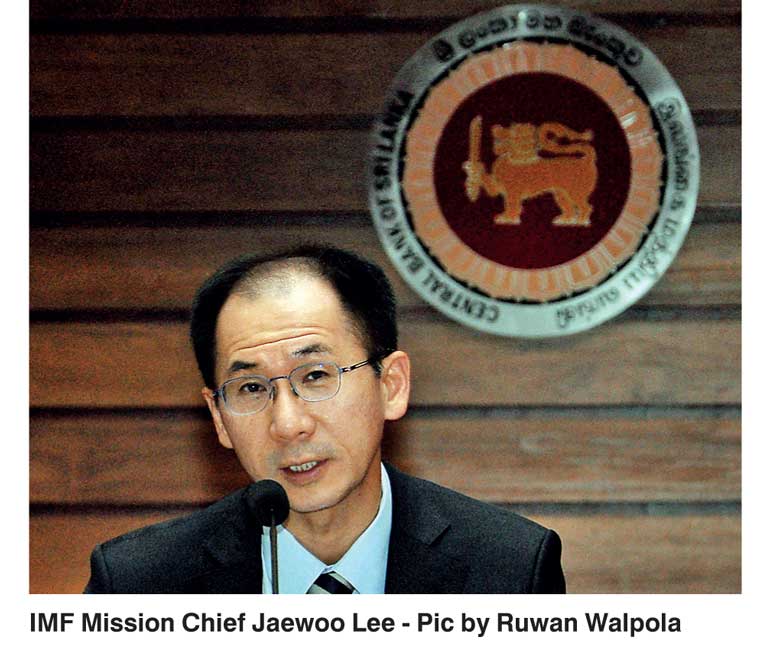Thursday Feb 26, 2026
Thursday Feb 26, 2026
Saturday, 30 September 2017 00:45 - - {{hitsCtrl.values.hits}}
 The passage of the landmark Inland Revenue Act is a major achievement which in turn will support the Government’s ambitious social and developmental program, the International Monetary Fund said yesterday but voiced concern over macroeconomic performance, which it described as “mixed” with drought and floods taking a toll on growth and inflation.
The passage of the landmark Inland Revenue Act is a major achievement which in turn will support the Government’s ambitious social and developmental program, the International Monetary Fund said yesterday but voiced concern over macroeconomic performance, which it described as “mixed” with drought and floods taking a toll on growth and inflation.
The rebuilding of net international reserves should continue to strengthen economic resilience, it added.
A staff team from the International Monetary Fund (lMF) led by Jaewoo Lee visited Colombo to hold discussions on the third review of the Sri Lankan authorities’ economic program that is being supported by a three-year Extended Fund Facility (EFF). The program aims to support the authorities’ ambitious reform agenda to put public finances on a sustainable footing and create space for a social and development program. The mission met with Prime Minister Ranil Wickremesinghe, Minister of Finance Mangala Samaraweera, State Minister of Finance Eran Wickramaratne, Governor of the Central Bank of Sri Lanka Indrajit Coomaraswamy, other public officials and representatives of the business community, civil society and international partners.
At the end of the visit Mr. Lee made the following statement:
The mission made significant progress toward reaching a staff-level agreement with the government on completing the third review of the EFF. Discussions will continue in October in Washington D.C. during the Annual Meetings of the IMF and the World Bank.
Overall, macroeconomic performance has been mixed. Growth has been subdued and inflationary pressures have increased reflecting the drought since late 201-6 and the floods earlier this year. Growth is projected to remain below 4.5% for 2017, and to rebound next year as agricultural production normalises and infrastructure projects pick up. The current account deficit is projected to widen somewhat this year due to higher imports of food and fuel related to the drought and floods. Capital inflows continue, supported by improving market confidence from the progress in reforms. As weather-related supply disruptions dissipate, headline inflation is expected to stabilise in the mid-single digits.
The mission commends the authorities for the strong efforts in implementing their IMF supported economic reform program with all quantitative performance targets through end-June 2077 having been met and the landmark Inland Revenue Act (iRA) legislation passed by Parliament.
Progress, on the other hand, has been mixed in implementing structural reforms-especially in relation to state-owned enterprises (SOEs) and public financial management.
Fiscal consolidation based on stronger revenues remains essential for reducing high public debt. To remain on this path, further broadening of the tax base is needed to fund the social and development spending in the 2018 budget. To this end, the focus should shift to the smooth implementation of the IRA through supporting regulations and manuals, efficient tax administration and greater awareness and preparedness of taxpayers through media outreach and information dissemination. Strengthening debt management capacity and developing a medium-term debt strategy would also enable effective management of the debt burden going forward.
The Central Bank of Sri Lanka (CBSL) should continue to remain vigilant in monitoring inflation pressures and stand ready to tighten monetary policy if needed to contain inflation or credit growth. The CBSL’s drive towards gradually rebuilding reserves should continue. In this regard, the mission welcomes the CBSL’s commitment to develop a roadmap for flexible inflation targeting and a flexible exchange rate regime, which will require strengthening the legal frameworks for CBSL’s governance, improving market functionalities and enhancing communication.
An important priority is to accelerate implementation of structural reforms in public financial management and SOEs. Large financial obligations of SOEs pose fiscal risks and need to be managed by enhancing oversight of performance indicators, developing SOE-specific reform strategies, and following through on fuel and electricity pricing reform. The mission also welcomes the broad-based strategy for improving the trade and investment climate, which will help bolster competitiveness and boost private sector-led growth.